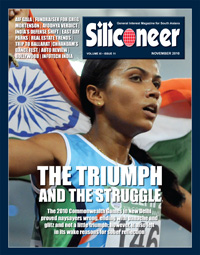EDITORIAL: 2010 Delhi Games
 There is something compelling about sporting events that captures the human imagination. Perhaps in a mechanized, impersonal world, the vivid human drama, the pitting of pure physical and mental strength of the various athletes against each other offers a gripping narrative that few people can resist. There is something compelling about sporting events that captures the human imagination. Perhaps in a mechanized, impersonal world, the vivid human drama, the pitting of pure physical and mental strength of the various athletes against each other offers a gripping narrative that few people can resist.
It is no wonder, then, that many nations around the world covet the chance of hosting large international sporting events. India grabbed its chance with alacrity when it took on the responsibilty of hosting the 2010 Commonwealth Games in New Delhi.
The rest, as they say, is history.
Actually it’s more like a Bollywood movie, complete with rollercoaster emotions, colorful villains, a melodramatic narrative packed with a dire predicament at the beginning and a stirring saga of redemption at the end, topped off with a trademark, flamboyant song-and-dance routine that would do a masala Bollywood blockbuster proud.
But kidding aside, the event and its hosting bear sober reflection.
Of course, there is cause for celebration — especially the great performance by India’s perenially neglected athletes. In total medal tally, India’s second position after Commonwealth sporting powerhouse Australia is nothing short of spectacular.
Also, despite the numerous glitches, large and small, in the beginning, the huge event comprising over 6,000 athletes from 71 countries was conducted with commendable organizational skill.
Still, the event leaves in its wake some important questions. While the event was finally conducted smoothly, the initial glitches brought international opprobrium for India. Why did it happen? Heads must roll.
Even more important, how much taxpayer money has gone into the event? India being India, it is given that some people have made obscene amounts of money, and have added insult to injury by not finishing in time.
As a matter of fact, many Western countries have become wary of hosting events like this because it ends up being a financial albatross, with taxpayers footing the bill.
India needs to revisit the rationale for hosting the event, and do a serious housecleaning of its sports organizers who almost succeeded in turning the event into a debacle. This month’s cover story takes stock of the 2010 Delhi Commonwealth Games.
While the applause over the recent Ayodhya verdict is yet to die down, our India editorial consultant and Magsaysay Award winner Sandeep Pandey raises troubling questtions about the verdict.
There has been justifiable relief over the calm and equanimity with which a verdict of one of the most communally divisive issues in contemporary India has been received, but analysts and jurists have questioned the rationale of a judgement that divides the disputed area where a 16th century mosque once stood.
The dispute over the Babri mosque has already caused considerable misery and threatened socio-political chaos in the wake of its destruction in December 1992. Even this time around, the Indian government had taken elaborate precautions as the entire country waited with bated breath for the aftermath of a verdict that was bound to be controversial.
Pandey takes a close, critical look at the verdict, because it has enormous implications for India’s identity as a secular country as well as the integrity of India’s independent judiciary. He offers his detailed views in an article in this month’s issue.
Greg Mortenson is one of those persons whose great work remote areas of Afghanistan and Pakistan is actually well known, thanks to his bestselling account, Three Cups of Tea. Mortenson presents a refreshing contrast with the other kinds of Americans that Afghans and Pakistanis hear about — armed to the teeth, determined to win their battle against the Taliban.
Without going into the debate of the rights and wrongs of the U.S.-led presence in Afghanistan, it can be safely said that Mortenson’s efforts have gained the U.S. far more friends in that turbulent part of the world.
Touched by the hospitality of a poor community in a mountainous part of Pakistan, Mortenson began a program to build a school for kids. Today that program has blossomed into the Bozeman, Montana-based Central Asia Institute, and it has built 168 schools and supports over 68,000 students.
A recent fundraising gala in Santa Clara, Calif., to support this laudable program, was headlined by Oscar-winning actress Helen Hunt, and over a thousand people attended the event. Our correspondent Ras Hafiz Siddiqui was there, and he filed a report in this month’s issue.
The Siliconeer family wishes all readers a very happy Diwali!
|